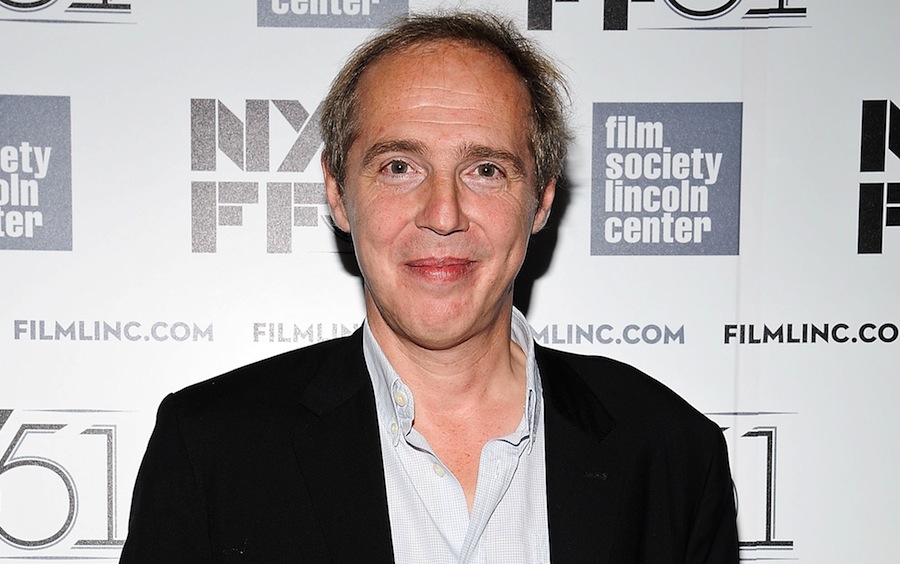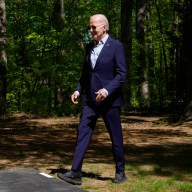Arnaud Desplechin loves talking film so much he doesn’t only talk about his own films. The French director (of “Kings and Queen” and “A Christmas Tale”) is in New York to promote “My Golden Days,” a prequel-of-sorts to his 1996 film “My Sex Life…or How I Got into an Argument,” visiting two of its characters, Paul and Esther (Mathieu Amalric and Emmanuelle Devos, though only Amalric appears), when they were young and first in love (and now played by Quentin Dolmaire and Lou Roy-Lecollinet). But he just saw “De Palma,” Noah Baumbach and Jake Kasdan’s doc about filmmaker Brian De Palma, and he gushes about the minimalist way it’s been shot and constructed. Soon we’re talking about Woody Allen, and it’s a miracle we quickly steered things back to his own (excellent) new film. RELATED: Review: “Midnight Special” is a better film about faith than “faith-based” films De Palma is someone who’s sometimes written off as trashy, but he has a strong critical fanbase. Are there other filmmakers you think are underrated? Even some of his films from the last 20 years are very interesting. Even Woody Allen is hard on Woody Allen. He openly disparages his own work. Onto “My Golden Years”: What first inspired you to return to the characters in “My Sex Life,” specifically in their youth? I also wanted to dig up this character of Paul. I remember I talked to Mathieu [Amalric] about it during the funeral of Alain Resnais. Mathieu was one of the actors carrying the coffin. It wasn’t a gloomy day; it was a glorious day, because Alain had just made a great film [“The Life of Riley”], and Mathieu was so proud to have done films with him. I asked him if he would come back to Paul. Twenty years ago we had invented a sort of hero and we didn’t realize it. I know he’s not a hero like Superman or Batman, but he is a superhero in his own way. Plus, the idea of doing a prequel was fun. The word “prequel” gave me energy in the writing process. At the same time there are plenty of subtle changes between the two films. For one, Lou Roy-Lecollinet looks little like Emmanuelle Devos. RELATED: Interview: Julie Delpy talks “Lolo,” parental anxieties and fearing Trump You’re making a film with young actors playing characters in the 1980s. What kinds of things did you notice was different between the generations? There’s another feeling that’s perhaps different. This is true in France but maybe not in the U.S., but in the ’80s a girl who was sleeping with everyone was a hero. She wasn’t a slut. You wanted to have her. Today [in France] a girl who dates too many boys would be called a slut. Thirty years ago she was crucial — you had to have her. She had so many guys and you wanted to be part of that list. It’s a small change between the generations. RELATED: Review: “River of Grass” revives Kelly Reichardt’s unique debut I always imagine your scripts as being jam-packed with little notes and alterations. Is it sometimes more like a blue print than something you follow religiously? Follow Matt Prigge on Twitter @mattprigge
Woody Allen. For years, decades he was underestimated. Film buffs are often half-and-half with him. But what he achieved with 12 films in 12 years between the ’80s and ’90s was just amazing — films like “Another Woman,” “Crimes and Misdemeanors,” “Zelig.” Some American critics are reluctant to like him — they think he’s too New York, too Caucasian, too whatever. Now we can see people really taking him seriously. Ten years ago I felt lonely when I was discussing Woody Allen with American critics.
I love “Deconstructing Harry.” “Magic in the Moonlight” is a good film. “Blue Jasmine” — I know American critics loved it because of the performances, which are stunning. But I saw it again on TV a few weeks and [shrugs]. “Magic in the Moonlight” was better.
There is a trend that I love in cinema, where people who are passionate about it say the same thing, which is silly, which is: It was so much better before. The cinema was silent, and soon as sound and dialogue came in, people said cinema was dead. Then came [Ingmar] Bergman, and Bergman said, “What I do is nothing compared to [Victor] Sjostrom or [Carl Theodor] Dreyer.” Then you come to Woody Allen and he says, “What I’m doing is nothing compared to Bergman.” It’s always about complaining that things are the same — but actually, cinema is always different. I love that people always complain that cinema is always done, and then it finds a way to reinvent itself with each generation.
The genesis of it was this idea of doing a prequel. “My Sex Life” begins with the narrator saying Paul and Esther have been together for 11 years and they’ve never really meshed. I wanted to know what was the beginning of that story, and explore this mystery about why they don’t match and yet are a perfect match.
In the writing process he became different than the Paul Dedalus [in “My Sex Life”]. Not that different, but slightly different. I didn’t try to be faithful to “My Sex Life.” Each time I could betray “My Sex Life” I was happy with it. One thing I love is that in that film Paul is very good in school. In [“My Golden Days”] he’s not that good. In that film he was a philosopher; in this film he’s an anthropologist. Small changes like that. The interior life is still the same. He still feels shallow in front of Esther, a woman who lives life so much.
One young actress was saying, “There are no cellphones.” But letters were the same as text messages. When you’re missing someone, it doesn’t matter if you have a cellphone or not. It’s not that big a change between then generations. I asked the young actors to be like their generation instead of mimicking my generation.
Something happened when we showed the film at Cannes that I’m quite proud of: The first question was about the amount of improvisation we did. One of the young actresses, she said, “None.” I love that people can think it’s improvised, because that means I did my job. When you see them speaking it should look like improvisation. But are they actually improvising? No way. To speak lines like these in real life? No way. I’m writing punchlines. I hate small talk — “Hello, you want a coffee?” — and when I would ask the actors to improvise they would give me small talk. I work on the script at night before the shoot, so I’ll give them a different script in the morning. I’m always working on the script, but when we’re shooting in the morning the text doesn’t change.
Arnaud Desplechin on ‘My Golden Days’ and loving Woody Allen

Getty Images


















